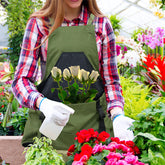What to Clean Garden Tools With: Essential Tips for Garden Maintenance
Table of Contents
- Introduction
- Why Clean Your Garden Tools?
- How Often Should You Clean Garden Tools?
- What Products to Use for Cleaning Garden Tools
- Steps to Clean Your Garden Tools
- Special Considerations for Different Tools
- Conclusion
Introduction
Have you ever picked up your gardening tools only to be greeted by the remnants of last season's gardening adventures? It’s not just dirt and grime; it’s a cocktail of pathogens that can easily transfer from one plant to another, jeopardizing the health of your garden. According to studies, dirty tools can spread diseases that affect plants, making regular cleaning not just an aesthetic choice but a necessity. At Garden Greenland, we believe that every gardener deserves to cultivate a thriving, healthy garden, and that starts with proper tool maintenance.
In this blog post, we will delve into the importance of cleaning your garden tools, the right products to use, and practical techniques to ensure your equipment stays in excellent condition. By the end, you'll not only learn what to clean garden tools with but also how to enhance your overall gardening experience. We’ll cover everything from basic cleaning methods to effective disinfectants, ensuring you have the knowledge you need to keep your tools in top shape.
We will explore the reasons behind cleaning garden tools, how often it should be done, and step-by-step instructions on cleaning various types of tools. Additionally, we will highlight the premium gardening products offered by Garden Greenland, designed to help you maintain your garden effortlessly. Let’s embark on this journey to elevate our gardening experience together!
Why Clean Your Garden Tools?
Cleaning garden tools is essential for several reasons:
- Preventing Disease Spread: Just like we wash our hands to prevent illness, cleaning garden tools helps eliminate pathogens that can infect plants. Diseases like blight or root rot can linger on tools and be transferred from one plant to another.
- Extending Tool Lifespan: Regular cleaning and maintenance can significantly prolong the life of your gardening tools. Removing dirt and sap prevents rust and corrosion, ultimately saving you money on replacements.
- Improving Efficiency: Clean tools work better. A sharp, clean blade makes precise cuts, which is crucial for plant health. Dirty or rusty tools can damage plants and hinder your gardening efforts.
- Creating a Positive Gardening Experience: Working with clean and well-maintained tools not only feels better but also enhances your overall gardening experience. It reflects a level of care and professionalism in your gardening practices.
Regularly cleaning your tools is not just about aesthetics; it’s about nurturing a healthy garden and ensuring your gardening experience is as enjoyable as possible.
How Often Should You Clean Garden Tools?
The frequency of cleaning your garden tools largely depends on how often you use them and the types of plants you’re working with. Here are some guidelines:
- After Each Use: Ideally, you should clean your tools after every use, especially if you've been working with infected plants. This helps prevent the transfer of pathogens.
- Seasonally: For avid gardeners who may not clean tools after every use, a thorough cleaning at the end of each gardening season is advisable. This is when you can inspect and maintain your tools for the next season.
- When Moving Between Gardens: If you're using tools in different gardens, it’s crucial to clean them before transitioning. This prevents cross-contamination of plants.
- Before Storage: Before storing tools for winter, ensure they are clean and dry. This will minimize the risk of rust and damage during the off-season.
By establishing a cleaning routine, you can ensure that your tools remain in excellent condition and your garden stays healthy.
What Products to Use for Cleaning Garden Tools
When it comes to cleaning garden tools, having the right products is essential. Here’s a list of tools and materials you might need:
Basic Cleaning Supplies
- Liquid Detergent: A gentle dish soap is effective for removing dirt and grime.
- Sponge or Washcloth: For scrubbing and wiping down tools.
- Stiff Brush: Ideal for removing stubborn dirt from rough surfaces.
- Bucket for Soapy Water: To hold your cleaning solution.
Disinfecting Solutions
- Bleach Solution: Mixing one part bleach with nine parts water can effectively disinfect tools, killing harmful pathogens.
- Rubbing Alcohol: Isopropyl alcohol (70% concentration) can be used for quick disinfection, especially on smaller tools like pruners and shears.
Rust Removal Supplies
- Sandpaper or Steel Wool: Useful for removing rust from metal surfaces.
- Vinegar: A natural rust remover that can be used in combination with baking soda.
- Baking Soda: Acts as an abrasive to help scrub off rust after soaking in vinegar.
Lubricating Oils
- Mineral Oil or 3-in-1 Oil: Effective for lubricating the moving parts of your tools.
- Linseed Oil: Recommended for treating wooden handles to prevent cracking and drying out.
Optional Tools
- Bucket for Bleach Solution: For soaking larger tools.
- Paper Towels or Towels: For drying tools after cleaning.
- Spray Bottle: For easy application of disinfectants.
These products will help ensure that your tools are not only clean but also well-maintained. At Garden Greenland, we offer high-quality gardening supplies and tools that can assist in your cleaning and maintenance efforts, enhancing your gardening experience.
Steps to Clean Your Garden Tools
Now that we have the right products, let’s go through the steps to effectively clean your garden tools:
Step 1: Remove Dirt and Debris
Before using any cleaning solution, remove visible dirt and debris from your tools. Use a stiff brush to scrub away soil, sap, and plant residues. For tools with hard-to-reach areas, consider disassembling parts if applicable.
Step 2: Wash with Soapy Water
Fill a bucket with warm water and add a few drops of liquid detergent. Dip a sponge or washcloth into the soapy water and scrub each tool thoroughly. Make sure to pay attention to crevices and joints where dirt can accumulate.
Step 3: Rinse and Dry
After scrubbing, rinse each tool under running water to remove soap and remaining dirt. Use a towel or paper towels to dry the tools completely. This step is crucial as moisture can lead to rust.
Step 4: Disinfect
To disinfect your tools, soak or spray them with a bleach solution or rubbing alcohol. For bleach, ensure you follow safety precautions: wear gloves and work in a well-ventilated area. Allow the disinfectant to sit for a few minutes before rinsing again.
Step 5: Lubricate Moving Parts
After cleaning and disinfecting, apply a few drops of mineral oil or 3-in-1 oil to the moving parts of your tools. This helps prevent rust and ensures smooth operation.
Step 6: Maintain Wooden Handles
For wooden-handled tools, apply linseed oil to keep the wood from drying out and cracking. This will maintain the integrity of the handles and extend the life of the tools.
Step 7: Store Properly
Finally, store your cleaned tools in a dry place. Consider hanging them on a wall or pegboard to keep them off damp surfaces, which can lead to rust.
Following these steps will keep your garden tools in excellent condition, ready for your next gardening adventure!
Special Considerations for Different Tools
Hand Tools
For hand tools like pruners, shears, and trowels, focus on cleaning the blades and handles. Use rubbing alcohol for quick disinfection between plants, and ensure that all sap is removed to maintain sharpness.
Larger Tools
For larger tools such as shovels and rakes, a pressure washer can effectively remove caked-on dirt. After washing, follow the same drying and lubricating steps to prevent rust and maintain functionality.
Power Tools
Power tools should be cleaned according to the manufacturer’s instructions. Generally, wiping down with a damp cloth and ensuring all parts are free from debris is essential. Make sure to check for any electrical connections and keep them dry.
Pots and Containers
Don’t forget to clean your pots and containers! Residues from previous plants can harbor diseases. Use soapy water to clean both the inside and outside, followed by a disinfectant rinse.
Conclusion
In conclusion, maintaining your garden tools is an essential part of successful gardening. By understanding what to clean garden tools with and following a systematic cleaning routine, you can prevent the spread of diseases and extend the life of your tools. Remember, a clean tool is not just a happy tool; it’s a tool that contributes to a flourishing garden.
At Garden Greenland, we are committed to supporting your gardening journey with premium tools and supplies. Whether you're looking for high-quality garden tools or effective cleaning solutions, we have you covered. Visit our Garden Tools Collection or explore our Garden Equipment Collection to find the best products for your gardening needs.
FAQ
1. How often should I clean my garden tools? It’s best to clean your tools after each use, especially if you've been working with infected plants. A thorough cleaning at the end of each gardening season is also advisable.
2. What are the best products to clean my garden tools? Liquid detergent, bleach solutions, rubbing alcohol, and mineral oil are effective for cleaning and maintaining tools. Always ensure you have a stiff brush and a sponge for scrubbing.
3. Can I use vinegar to clean my tools? Yes, vinegar is an excellent natural cleaner that can help remove rust and grime. It can be particularly effective when combined with baking soda.
4. What should I do if my tools are rusty? To remove rust, soak your tools in vinegar for a few hours, then scrub with baking soda. For severe rust, sandpaper or steel wool may be necessary.
5. How do I store my garden tools? Store your tools in a dry place, preferably hanging on a wall or pegboard to keep them off damp surfaces, which can lead to rust.
By integrating these practices into your gardening routine, we can all enjoy a healthier and more productive gardening experience together. Happy gardening!









